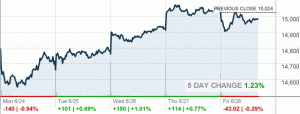Good news. The economy still stinks.
In today’s economy, which is driven by The Federal Reserve Board’s quantitative easing (QE) program, bad news is good news and good news is bad news. That’s because if the economic news is bad, The Fed will be more likely to continue buying bonds, propping up the stock market.
A month ago, the U.S. Bureau of Economic Analysis (BEA) estimated an annualized growth rate of 2.4% for the first quarter of 2013, but on Wednesday the BEA revised its estimate and said the economy grew at a rate of only 1.8%, a full 25% drop.
Growth of 1.8% is 45% lower than the 3.3% average annual growth in gross domestic product (GDP) the U.S. economy has enjoyed post-World War II. Yet the Dow Jones Industrial Average and the S&P 500 each jumped a full percentage point on the news. The DJIA was up 149.83 points and the S&P 500 was up 15.23 points.
Why QE?
The goal of QE, we were told, was to cut unemployment to 6.5%. After more than five years and three rounds of QE (plus Operation Twist), the unemployment rate stands at a dismal 7.3% — and that’s the misleading U-3, which includes part-time workers as employed, but excludes those who have given up looking for work from the unemployed.
Given the results, it may be logical to conclude that QE isn’t working and should be stopped. But logic has little to do with it. Economists are now predicting that QE will continue, without a “tapering” of bond buying anytime soon. Some believe buying may even accelerate beyond the current rate of $85 billion a month.
Of course, just last week economists were predicting that tapering would begin in September.
More Slow Growth
The story of QE’s failure to stimulate the economy has been ongoing.
Since coming out of the recession, growth has been underwhelming, even as The Fed has quadrupled its bond holdings. GDP grew at a rate below 2.4% in 2010, just above 1.8% in 2011 and 2.2% in 2012.
It’s also not the first time that slow growth has given the market a boost. As we previously noted, When the BEA announced that the economy shrank by 0.1 percent during the fourth quarter of 2012, the announcement helped the stock market finish its best January performance since 1994.

